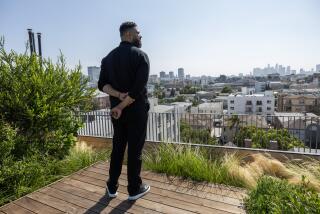Northridge Tragedy Puts Landlord Into Limelight : Earthquake: Rich but private Shashikant Jogani owns the building in which 16 died. He seems a paradox.
- Share via
NORTHRIDGE — In the 25 years since he immigrated from India, Shashikant Jogani quietly built a real estate empire, borrowing to buy apartment buildings no one else wanted, fixing them up, then leveraging them to buy more.
Jogani became a rich man, and one of Los Angeles’ largest residential landlords.
But 30 seconds of shaking on Jan. 17 brought one of Jogani’s jewels--the three-story, 164-unit Northridge Meadows apartment building--groaning to the ground as the first floor collapsed, killing 16 tenants in their beds. The scene of the highest concentration of quake fatalities, the Reseda Boulevard complex came to symbolize the temblor’s deadly force.
The tragedy has thrust Jogani, a savvy businessman with a passion for privacy, into the limelight. The picture that emerges from interviews with associates, clients, and from public records, is one of paradox.
He is respected as a symbol of American entrepreneurial success, but acknowledges serious financial difficulties.
The quake has forced the evacuation of hundreds of the apartments he controls, amounting to 15% of his holdings. Four years ago, his wealth was estimated at $375 million; last week, Jogani issued a statement to The Times asserting that aside from the estimated $9-million loss at Northridge Meadows, the continuing recession has meant that “equities in my other properties have vanished.”
Jogani is considered a role model in the Southland’s closely knit, 3,000-member community of Jains, an Indian religious sect that teaches asceticism, nonviolence, and vegetarianism. Yet at least one tenant, a creditor, and the city of Los Angeles have filed lawsuits against Jogani, asking the courts to force him to better maintain his residential properties.
Although he has earned a reputation as a shrewd and skillful negotiator, Jogani will never distinguish himself as a great communicator.
After the quake, survivors attacked their landlord as distant and aloof from their misery.
But an aide insisted that Jogani donned a hard hat and personally helped tenants salvage belongings, and offered generous terms at his other apartment complexes for those left homeless.
“No matter how great my loss,” Jogani said in a prepared statement, “it does not compare to the loss of those who died in the earthquake. My deepest sympathies go to their families and friends.”
Jogani learned about the collapse of Northridge Meadows while listening to his battery-operated radio after being jolted awake in his Glendale home.
Like most people, he was without electricity or telephones. He said he didn’t realize “the magnitude of the tragedy” until later on Jan. 17.
The news that some of his tenants had died in the rubble pitched him into “shock and grief,” according to the Jogani statement. He added that his shock was followed by feelings of pain and sorrow for the families of the dead. Then came a sense of helplessness, he said.
The father of two small children, Jogani insisted that he is not an uncaring landlord and real estate mogul, as some tenants have portrayed him.
“I was also concerned about all of the residents whose lives had been turned upside down and were now without a place to live,” he said. He offered tenants discounted lodging at another apartment building in Van Nuys: Only five families accepted. He said he promptly returned security deposits and refunded pro-rated rents. He hired engineers to make sure that it was safe to re-enter Northridge Meadows.
Those who know him say Jogani, 47, never has been comfortable in the spotlight: In fact, drawing attention to oneself goes against the teachings of Jainism. The sect’s name is derived from the words for conquering the body, or material self.
“Indian culture encourages silent good deeds,” said Gordhan Patel, vice president of the Federation of Indo-American Assns. and a longtime Jogani friend. “That is the way the people are raised in the homes, society and religious institutions.”
Although he still drives a brown 1987 Cadillac, he is the Jains’ most obvious example of an American success story.
“He has been a pioneer in the Indian community,” said Dr. Krishna Reddy, the federation’s president. “He’s been very successful, a good role model. He provides jobs and helps people in the community financially. Others look up to him quite obviously.”
Born near Bombay, Jogani came to California in 1969 to study chemical engineering at USC. As a young man, Jogani and other Jains lived on Berendo Street in Los Angeles.
Now he owns a 38-unit apartment building worth $1.5 million on that street.
For a while after graduating from USC, Jogani sold beads and worked as a hotel bellhop, then started a jewelry business, called Gemlust. He comes from an old family, which with other Jain families, has been heavily involved in the uncut-diamond trade for a century. He still runs several jewelry companies from his Hill Street offices, in the heart of the Los Angeles jewelry district.
Diamonds gave him the seed money, but real estate was Jogani’s path to fortune. In the late 1970s, he attended a few seminars, read some how-to books, and started buying apartment buildings.
“Diamonds got us started, but California real estate is where the real money is,” Jogani said in an interview three years ago. “Most of the big millionaires in America made their money in real estate. I take my clue from that.”
He bought his first apartment building in 1979--a small Glendale complex that he purchased for about $500,000. By 1990, a profile in Forbes magazine estimated the value of Jogani’s holdings at $375 million--but noted that they were encumbered by $280 million in debt.
He’s worth much less now, Jogani’s attorney Steven E. Glass said, since Jogani and other landlords have been pummeled by the recession’s plummeting property values and escalating vacancy rates.
Property records show that Jogani and his wife, Renuka, still own more than two dozen Valley apartment complexes, located in working class neighborhoods in Van Nuys, North Hollywood, San Fernando, Sylmar, Northridge and Canoga Park. He also owns properties in Hollywood, as well as more than two dozen properties in Orange County.
Northridge Meadows was a good example of how Jogani built his fortune. He bought the complex, then almost 10 years old, from builder Brian Heller in 1981, paying about $3.5 million. Property records show that the complex was in fair condition and that Jogani took out a $500,000 conventional loan.
In December, 1992, he restructured his financing for the building. Jogani, acting as an individual, sold the property to S J Properties No. 4, one of his holding companies. The building was assessed at $6.8 million, twice what it was worth 10 years earlier, and he took out a $1.2-million mortgage from First Nationwide Bank.
Northridge Meadows was well-maintained, boasting “resort-style living.” The tenants--including students at nearby Cal State Northridge, working singles and retired elderly--paid monthly rents from about $650 to $850 and enjoyed use of a courtyard pool, putting green, barbecue pits and landscaping that included ponds and running streams. Some had lived there 20 years.
Some of Jogani’s holdings have been more controversial.
Two apartment buildings on Blythe Street in Van Nuys allegedly were notorious drug-dealing havens in 1988, when the city attorney’s office filed a nuisance-abatement lawsuit against the Joganis. The city sought to close down the apartments for a year, but the case was resolved when the Joganis agreed to install lighting, erect a chain-link fence, remove graffiti and hire security guards to patrol the grounds.
Court records show that Jogani has been named as a defendant in scores of other lawsuits over the last decade. Many of the cases could be classified as routine stumble-and-fall litigation. One pending suit, filed by Luz Estaquio and Faviola Esquivel, former tenants of a North Hollywood complex that Jogani owns, alleges slum-like conditions in their $510-a-month apartment: damaged carpets, no hot water or smoke detectors, leaking roofs and walls, mildew and cockroaches. A hearing is scheduled this week in Van Nuys Superior Court.
In another lawsuit, a creditor sought a court order forcing Jogani to maintain a 46-unit apartment building at 8634 Columbus Ave. in Sepulveda, which the lender alleged was deteriorating while Jogani was defaulting on his loan payments. The building was yellow-tagged after the earthquake--restricting entry--with repairs estimated at $200,000.
Late last year, Jogani was accused in a lawsuit by the NAACP’s Legal Defense & Education Fund of discriminating against prospective African American tenants, charging them higher rents and security deposits and limiting their numbers.
Jogani wouldn’t discuss details of his financial situation, nor would several banks that hold large Jogani mortgages on Northridge Meadows and other condemned or damaged Jogani properties.
But even before the earthquake, times were extremely tough for apartment complex investors, said Dinker Shah, a former Jogani employee who now owns a property management company.
Jogani, he said, is “a real nice fellow. He means no harm to anybody, but things have turned against a lot of apartment owners.”
“I’ve spent 16 years in business, and I’ve never seen anything like this. It is not a recession. It is a depression,” Shah said.
Jogani, who declined repeated requests for an interview, said in the prepared statement that the Northridge earthquake “has been devastating to me personally and financially.”
Northridge Meadows is a “total loss” and “must be demolished and the land cleared as soon as possible,” he said.
Engineers who studied the building shortly after the collapse noted an absence of plywood in the walls, which would have stiffened the structure and enhanced its ability to withstand the quake. The building met code requirements in effect when it was completed in 1972.
Jogani said he, like most apartment building owners, has no earthquake insurance. The premiums are too expensive and the deductible too high, he said.
Friends said he has been profoundly affected on a personal level.
He was deeply depressed by the deaths at Northridge Meadows, Patel said. “The loss of human life is totally unacceptable to the Jain belief,” he said. “Any living organism, you do not harm it. You do not even kill a fly.”
And, he said, Jogani feels guilty, even though the earthquake was a natural disaster. “We tend to associate a self-guilt,” he said. “I am sure it has crossed his mind, ‘Why my building?’ ”
* ROAD TO RECOVERY: A section of the Simi Valley Freeway reopens. B1
More to Read
Sign up for Essential California
The most important California stories and recommendations in your inbox every morning.
You may occasionally receive promotional content from the Los Angeles Times.













